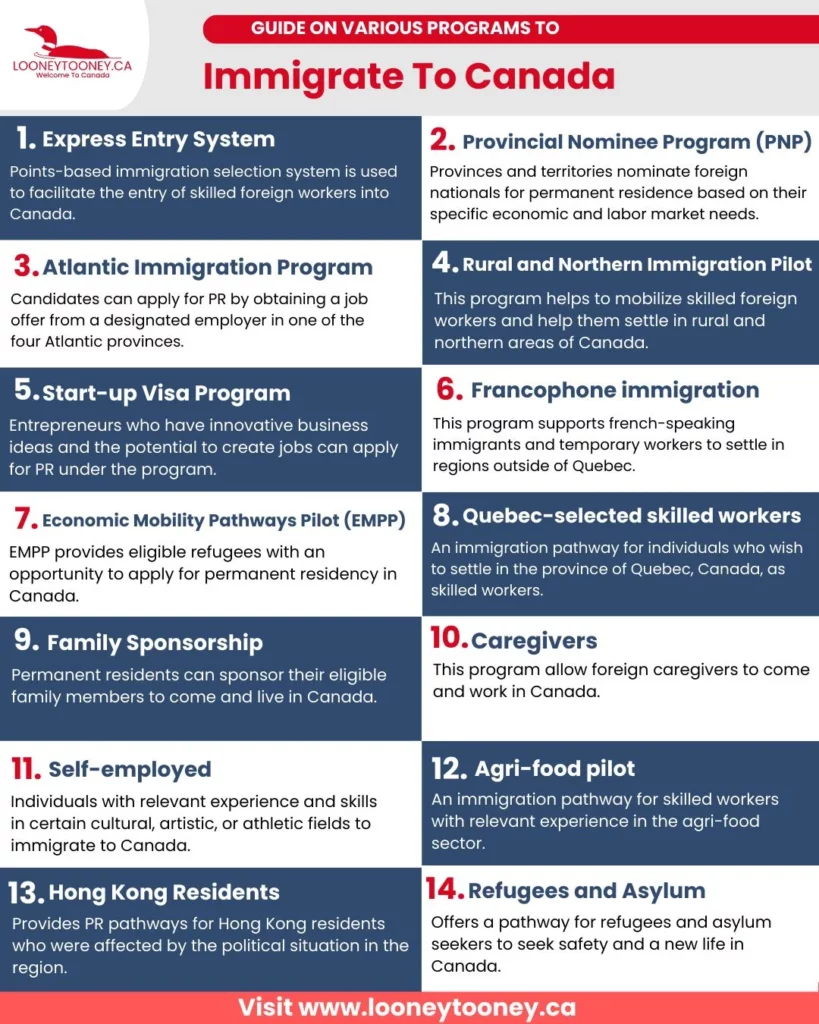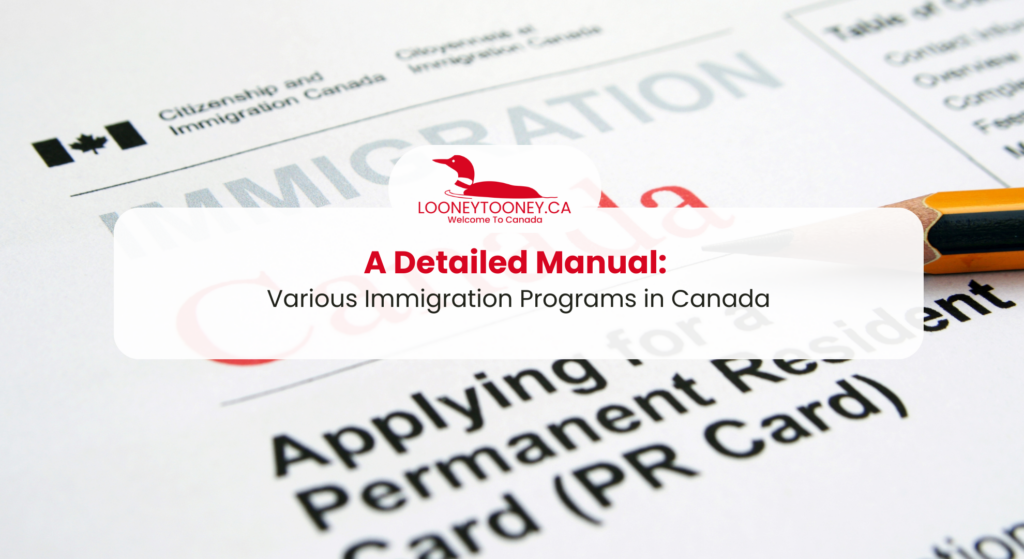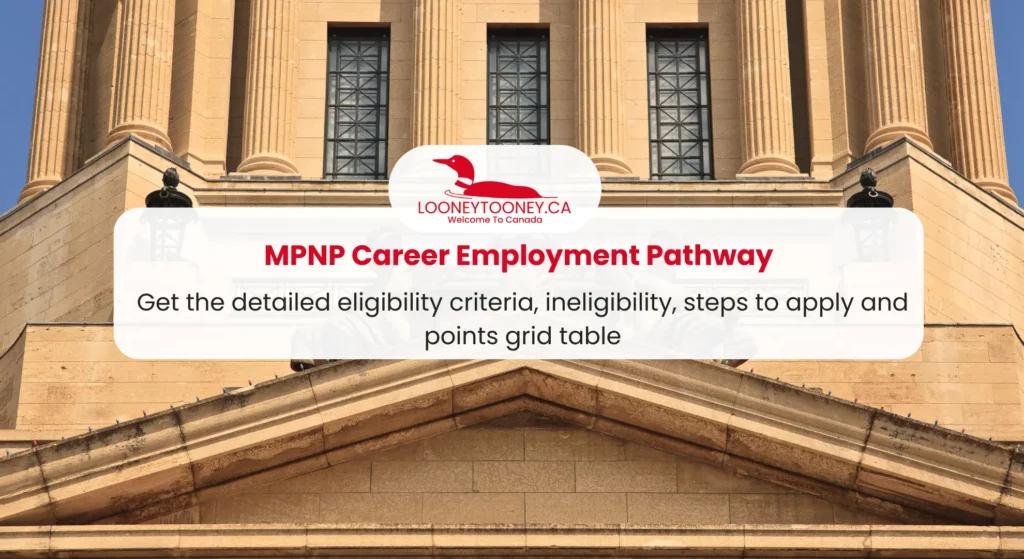Canada has a long history of being hailed as a country of opportunity because it provides a high standard of living, excellent medical care, a diverse culture, and a strong economy. Various Immigration Programs in Canada help people and families to realize their goals of settling in this friendly nation, making it a popular destination for immigrants from all over the world.
It is expected that Canada will get more than 1.3 million new immigrants between 2022 and 2024. In this thorough guide, we’ll discuss the primary services offered to an immigrant to move to Canada.
Table of Contents
- What are the Ways to Immigrate to Canada?
- Express Entry System
- Provincial Nominee Program (PNP)
- Atlantic Immigration Program (AIP)
- Start-up Visa Program
- Rural and Northern Immigration Pilot (RNIP)
- Economic Mobility Pathways Pilot (EMPP)
- Francophone Mobility
- Family Sponsorship
- Quebec-Selected Skilled Workers
- Caregivers
- Self-Employed
- Agri-Food Pilot
- Permanent Residence Pathways for Hong Kong Residents
- Refugees and Asylum
- A Recap of Immigration Programs in Canada
- FAQs on Immigration Programs in Canada
What are the Ways to Immigrate to Canada?
Several Immigration Programs in Canada serve as pathways for Canadian immigration. These immigration programs provide opportunities for individuals to contribute to the country’s growth, reunite with loved ones, or embark on new business ventures. The following is the list of various immigration programs in Canada through which an individual can immigrate to Canada.

1. Express Entry System
The Express Entry system is a points-based immigration selection system used by the Canadian government to manage and facilitate the entry of skilled foreign workers into Canada. It is introduced to attract individuals who have the potential to contribute to the Canadian economy and society.
To apply through Express Entry, candidates need to create an online profile where they provide information about their age, education, work experience, language proficiency, and other factors. Based on this information, candidates are assigned a Comprehensive Ranking System (CRS) score. Different types of draws are conducted, and candidates with the highest CRS scores are issued Invitations to Apply (ITAs) for permanent residence. Once an ITA is received, applicants have a limited time to submit their complete application and pay the required fees to finalize their immigration process.
Eligibility for Express Entry
To be considered for the Express Entry pool, candidates must:
- Be eligible for one of the initiatives within Express Entry.
- Have at least one year of skilled work experience (specific to the program they’re applying under).
- Meet or exceed the language proficiency requirements in English or French.
- Have a Canadian educational credential or a foreign equivalent verified through an Educational Credential Assessment (for FSWP).
- Have relevant work experience in Canada (for CEC).
- Receive a nomination from a province (for PNP).
- Meet specific criteria based on the skilled trade (for FSTP).
2. Provincial Nominee Program (PNP)
The Provincial Nominee Program (PNP) was introduced to allow individual provinces and territories to nominate foreign nationals for permanent residence based on their specific economic and labor market needs. Each province and territory in Canada, except for Quebec (which has its own selection process), has its own PNP with unique eligibility criteria and streams targeting various categories of skilled workers, entrepreneurs, and other in-demand occupations.
The provinces and territories are responsible for selecting and nominating candidates who have the skills, work experience, and intent to settle in that particular region. The nominated individuals receive a provincial nomination certificate, which they can use to apply for permanent residence to IRCC. Provincial Nominee Programs provide an excellent opportunity for foreign workers and entrepreneurs to establish themselves in specific regions of Canada that match their qualifications and experience, thus contributing to the local economies and communities.
Eligibility for Provincial Nominee Program
While the specific criteria can vary between provinces and territories, generally, to be eligible for the PNP, candidates must:
- Have a job offer from an employer in the nominating province or territory.
- Have the necessary education, skills, and professional background to benefit the economy of the specified province or territory.
- Plan to live in the province or territory that nominates you.
- Meet the province or territory’s specific criteria as each has its own “streams” (immigration programs targeting certain groups).
Below is a list of various Provincial Nominee Programs:
- Alberta Immigrant Nominee Program (AINP)
- British Columbia Provincial Nominee Program (BC PNP)
- Manitoba Provincial Nominee Program (MPNP)
- New Brunswick Provincial Nominee Program (NB PNP)
- Newfoundland and Labrador Provincial Nominee Program (NLPNP)
- Northwest Territories Nominee Program (NTNP)
- Nova Scotia Nominee Program (NSNP)
- Ontario Immigrant Nominee Program (OINP)
- Prince Edward Island Provincial Nominee Program (PEI PNP)
- Saskatchewan Immigrant Nominee Program (SINP)
- Yukon Nominee Program (YNP)
3. Atlantic Immigration Program (AIP)
The Atlantic Immigration Program (AIP) was launched in 2017 as a pilot project to address the unique demographic and labor market challenges faced by these provinces. It is introduced to attract and retain skilled workers, international graduates, and their families to the four Atlantic provinces of Canada: New Brunswick, Newfoundland and Labrador, Nova Scotia, and Prince Edward Island.
The eligible candidates can apply for permanent residency by obtaining a job offer from a designated employer in one of the four Atlantic provinces under this program. Alternatively, international graduates from recognized post-secondary institutions in Atlantic Canada may also qualify for permanent residency through the program, even without a job offer.
The AIP aims to support the economic growth and development of the Atlantic provinces by attracting skilled workers who can contribute to the local labor market and communities. It offers a pathway to permanent residency for individuals who meet the specific criteria set by the program and are willing to live and work in one of the participating Atlantic provinces.
Eligibility for the Atlantic Immigration Program
To qualify for the AIP, applicants must:
- Possess an employment proposal from an employer situated in one of the Atlantic regions.
- Meet the education, work experience, and language ability requirements of the job.
- Demonstrate they have sufficient funds to support themselves and their family when settling in the Atlantic region.
- Show an intention to reside in the Atlantic province where they have a job offer.
Program Streams: The AIP offers three distinct streams to cater to different applicant profiles
- Atlantic High-Skilled Program (AHSP): For candidates with a high-skilled job offer and at least one year of work experience in a skilled occupation.
- Atlantic Intermediate-Skilled Program (AISP): For those with a job offer needing high school education and specific job training.
- Atlantic International Graduate Program (AIGP): For international graduates from publicly-funded institutions in the Atlantic region.
4. Start-up Visa Program
The Start-Up Visa Program was launched with the objective to attract foreign entrepreneurs who have innovative business ideas and the potential to create jobs and contribute to the Canadian economy. To be eligible for this program, entrepreneurs must secure a commitment from a designated Canadian venture capital fund, angel investor group, or business incubator. These designated organizations must be willing to invest in the applicant’s start-up business idea.
Applicants need to demonstrate that their business idea is innovative, viable and has the potential for significant growth in Canada. If approved, the applicant and their immediate family members can obtain Canadian permanent residence.
Eligibility for Start-up Visa Program
To be considered for the Startup Visa Program, applicants must:
- Possess a suitable business in which each participant has a minimum of 10% of the voting rights linked to all the existing shares of the corporation. Combined with the designated entity, they should hold over 50% of the overall voting rights.
- Obtain a letter of support from a designated entity (venture capital fund, angel investor group, or business incubator).
- Meet the language requirements in either English or French at a minimum Canadian Language Benchmark (CLB) level of 5.
- Demonstrate sufficient settlement funds to support themselves and their dependents upon arrival in Canada.
5. Rural and Northern Immigration Pilot (RNIP)
The Rural and Northern Immigration Pilot (RNIP) was launched in 2019 aiming to address labour market challenges in smaller communities and regions across the country. This program helps to attract skilled foreign workers to settle in rural and northern areas of Canada, where there is a need for a more diverse workforce to support local economic development and growth.
Each community has its own specific labour market needs and eligibility criteria. Interested candidates must first secure a job offer from an employer in one of the participating communities. Once they have a valid job offer that meets the program requirements, candidates can apply for a recommendation from the community through the RNIP. If recommended, they can then apply for permanent residence to Immigration, Refugees, and Citizenship Canada (IRCC).
The Rural and Northern Immigration Pilot provides an opportunity for skilled workers, including those in occupations that may not be eligible under other immigration programs, to build a new life in smaller Canadian communities while contributing to their economic and social development. The following is the list of communities participating in RNIP.
- North Bay, ON
- Sudbury, ON
- Timmins, ON
- Sault Ste. Marie, ON
- Thunder Bay, ON
- Brandon, MB
- Altona/Rhineland, MB
- Moose Jaw, SK
- Claresholm, AB
- Vernon, BC
- West Kootenay (Trail, Castlegar, Rossland, Nelson), BC
Eligibility for Rural and Northern Immigration Pilot
To be considered, applicants must:
- Have a referral from a participating community.
- Obtain a qualifying job offer for a full-time, permanent position in one of the participating communities.
- Meet or exceed the educational requirements, equivalent to a Canadian high school diploma or higher.
- Fulfill the necessary language benchmarks in English or French.
- Demonstrate they have sufficient funds to support their transition into the community.
- Intend to live in the recommended community.
6. Economic Mobility Pathways Pilot (EMPP)
The Economic Mobility Pathways Pilot (EMPP) combines economic immigration and refugee resettlement initiatives. Its primary objective is to assist skilled refugees in immigrating to Canada and contribute to the country’s workforce and society.
The EMPP provides eligible refugees with an opportunity to apply for permanent residency in Canada based on their skills, work experience, and ability to positively contribute to the Canadian economy. This program recognizes the potential and talents of skilled refugees and aims to support their successful integration into the Canadian labor market and communities.
There are two ways to apply for PR under this program.
- Through any of the following 3 programs referred as regional EMPP
- Atlantic Immigration Program
- Provincial Nominee Program
- Rural and Northern Immigration Pilot
- You can apply just to EMPP known as federal EMPP
Eligibility for the Economic Mobility Pathways Pilot
To be considered under the EMPP, applicants must:
- Be recognized as a refugee by either the United Nations Refugee Agency (UNHCR) or a foreign state.
- Reside outside of Canada.
- Meet the requirements of one of the three economic immigration programs under the Express Entry system: the Federal Skilled Worker Program, the Federal Skilled Trades Program, or the Canadian Experience Class.
- Meet or exceed the language requirements in either English or French.
- Have a valid job offer in Canada or be able to prove their ability to support themselves and their family once in Canada.
- Meet the education requirements, as determined by an Educational Credential Assessment.
7. Francophone Mobility
The Francophone Mobility Program is aimed at promoting the mobility of French-speaking individuals within the country. The program seeks to enhance the vitality of Francophone minority communities by encouraging French-speaking immigrants and temporary workers to settle in regions outside of Quebec, where Francophone communities are smaller. This initiative not only helps to diversify and strengthen these communities but also fosters linguistic and cultural diversity across Canada.
Under the Francophone Mobility Program, eligible individuals may receive support and facilitation in their immigration or temporary work processes, along with assistance in finding employment or settling in Francophone communities. By promoting Francophone integration and encouraging French-speaking individuals to live and work in various regions of Canada, the program contributes to the growth and preservation of the French language and culture, enriching the overall social fabric of the country.
Eligibility for Francophone Mobility
For Applications Submitted on or after June 15, 2023
To qualify for this program, you must:
- Meet the general eligibility criteria for a work permit.
- Reside and work in one of the 9 Canadian provinces or 3 territories outside Quebec.
- Demonstrate your ability to communicate in French at an intermediate level. This corresponds to a niveaux de compétence linguistique canadiens (NCLC) level 5 or higher.
- Possess a job offer falling under any Training, Education, Experience, and Responsibilities category of the National Occupational Classification (NOC) system, excluding primary agriculture occupations.
For Applications Submitted before June 15, 2023
To be eligible, you must have:
- Satisfied the general eligibility prerequisites for a work permit.
- Opted to live and work in one of the 9 Canadian provinces or 3 territories outside Quebec.
- Convinced a processing officer that you could attain a minimum score of 7 on the niveaux de compétence linguistique canadiens (NCLC) test.
- Secured an employment offer categorized under TEER 0, 1, 2, or 3 within the NOC.
Bringing Your Family with You
If your spouse, common-law partner, or dependent children intend to work in Canada, they may be eligible to apply for an open work permit. Determine their work permit eligibility. Moreover, your dependent children can pursue their education in Canada while you are employed.
8. Family Sponsorship
The Family Sponsorship Immigration Program in Canada allows Canadian citizens and permanent residents to sponsor their eligible family members to come and live in Canada as permanent residents. This program was introduced to reunite families and support family unity by providing a pathway for close relatives to join their loved ones in Canada.
Through the Family Sponsorship Program, Canadian citizens and permanent residents can sponsor their spouses or common-law partners, dependent children, parents, and grandparents for permanent residency. Sponsors must demonstrate their ability to financially support the sponsored family members and meet certain requirements set by the Canadian government.
The program plays a crucial role in facilitating family reunification and enabling families to build a new life together in Canada.
Eligibility for Sponsors: To be eligible to sponsor a family member, a person must
- Hold Canadian citizenship or possess permanent residency status.
- Be at least 18 years old.
- Reside in Canada.
- Sign an agreement stating that they will provide financial support for the relative and any accompanying family members.
- Proving they have sufficient income to provide for the basic needs of the sponsored family members.
Eligible Relatives for Sponsorship: Individuals who are Canadian citizens or hold permanent residency have the ability to sponsor these family relations
- Spouse, common-law partner, or conjugal partner.
- Dependent children.
- Parents or grandparents (through the Parent and Grandparent Program).
- Orphaned siblings, nephews, nieces, or grandchildren under 18 who aren’t married or in a relationship (some conditions apply).
- Any other relative, regardless of age, if the sponsor doesn’t have any of the above-mentioned relatives or family members (in specific situations).
9. Quebec-Selected Skilled Workers
The Quebec-selected skilled workers program is a specific immigration pathway for individuals who wish to settle in the province of Quebec, Canada, as skilled workers. Unlike other provinces in Canada, Quebec has its own immigration selection system and criteria for selecting skilled workers who want to live and work in the province.
Under this program, candidates are required to go through a two-step process. First, they must apply to the Quebec government for a Quebec Selection Certificate (Certificat de sélection du Québec or CSQ). To be eligible, candidates are assessed based on factors such as education, work experience, language proficiency, age, and adaptability. Those who receive a CSQ are then allowed to apply for permanent residency.
The Quebec-selected skilled workers program enables the province to attract and retain individuals with specific skills and qualifications that align with Quebec’s labour market needs and cultural priorities. By selecting skilled immigrants who are likely to integrate successfully into Quebec society, the program contributes to the province’s economic growth and social development.
Eligibility: To be considered for Quebec immigration, applicants must
- Intend to settle in Quebec and sign an agreement to live there.
- Meet the specific criteria of the program they apply to, which can vary based on whether they apply as skilled workers, businesspeople, students, or family members.
- Undergo a medical examination and security check.
- Demonstrate knowledge of French, given the province’s French-speaking majority. The level of knowledge required can vary based on the specific program.
Programs under Quebec Immigration: Quebec offers various immigration programs, each tailored for different types of applicants
- Quebec Skilled Worker Program
- Quebec Experience Program
- Quebec Business Immigration
- Quebec Family Class
- Quebec Refugee and Other Humanitarian Categories
10. Caregivers
The Caregivers Program in Canada was launched to allow foreign caregivers to come and work in Canada to provide care for children, elderly individuals, or individuals with disabilities. The program helps Canadian employers who require the services of caregivers and also provides an opportunity for foreign workers to gain Canadian work experience and, in some cases, apply for permanent residency.
Caregivers who come to Canada through this program can work full-time and may be eligible to apply for permanent residency after meeting certain work experience requirements. The program aims to address labor shortages in the caregiving sector while providing a pathway for caregivers to potentially become permanent residents in Canada, thereby supporting their long-term settlement and integration into Canadian society.
Eligibility for Caregivers
To qualify for the Caregivers Immigration Program, applicants must:
- Hold an authentic employment proposal from an employer in Canada.
- Meet the language and education requirements, typically equivalent to a Canadian high school diploma and a minimum language proficiency level.
- Have relevant work experience, usually a specified number of hours in caregiving roles within a certain timeframe.
Program Streams: The Caregivers Immigration Program comprises different streams tailored to specific caregiving roles
- Home Child Care Provider Pilot: For caregivers who provide childcare in a private residence.
- Home Support Worker Pilot: For caregivers assisting the elderly or those with medical needs in a private residence.
11. Self-Employed
The Self-Employed Immigration Program allows individuals with relevant experience and skills in certain cultural, artistic, or athletic fields to immigrate to Canada as self-employed individuals. This program is designed for those who can contribute to Canada’s cultural or athletic scene and have the intention and ability to be self-employed in their field of expertise.
To be eligible for the Self-Employed Immigration Program, applicants must have a minimum of two years of relevant experience in cultural activities, athletics, or farm management. They are also required to demonstrate their intent and ability to establish and manage their own self-employed business in Canada. Additionally, applicants are assessed based on various criteria, including their experience, age, education, language proficiency, and their potential to make a significant cultural or athletic contribution to Canada.
Successful applicants under this program receive permanent resident status, allowing them and their accompanying family members to live and work in Canada. The Self-Employed Immigration Program aims to enrich Canada’s cultural and athletic landscape by attracting individuals with unique talents and skills, fostering diversity, and promoting cultural exchange within the country.
Eligibility for Self-Employed Persons
Applicants must
- Possess relevant experience in cultural activities, athletics, or farm management.
- Intend and demonstrate the capability to establish a business in Canada in the mentioned fields.
- Score at least 35 points on a selection grid evaluating age, education, experience, adaptability, and language skills.
12. Agri-Food Pilot
the Agri-Food Immigration Pilot in Canada was a specialized immigration program introduced to address the labor shortages in the agri-food sector. It aimed to attract and retain experienced foreign workers to fill year-round, non-seasonal positions in the agriculture and food processing industries.
The pilot program offered a pathway for eligible foreign workers to apply for permanent residency in Canada. To be eligible, candidates needed to have valid job offers from Canadian employers in specific eligible occupations within the agri-food sector.
The Agri-Food Immigration Pilot sought to support the growth and sustainability of the agriculture and food processing industries by providing a way for skilled foreign workers to settle in Canada permanently and contribute to the country’s economy and food production.
Eligibility for Agri-Food Immigration Pilot
To qualify, applicants must
- Have a full-time, non-seasonal job offer from a Canadian employer in the agri-food sector.
- Possess Canadian work experience in one of the eligible industries, such as meat processing, greenhouse crop production, or animal raising.
- Fulfill or surpass the linguistic criteria in English or French.
- Have a foreign equivalent of a Canadian high school education or higher.
- Prove they have enough funds to support themselves and their family members when settling in Canada unless they are already working in Canada.
13. Permanent Residence Pathways for Hong Kong Residents
Canada has been actively assisting Hong Kong residents since 2021 by introducing dedicated immigration pathways for those from Hong Kong who seek to establish themselves in Canada. These initiatives were a response to the national security law imposed by the Chinese government in Hong Kong, which raised concerns regarding the erosion of civil liberties and human rights.
Furthermore, the Canadian government has recently extended and broadened open work permits for Hong Kong residents. This expansion ensures a smoother transition from temporary to permanent residency for those who aspire to make Canada their new home. By attracting individuals with Canadian work experience, Canada aims to leverage their skills and contributions, thereby enriching the nation’s labor force and fostering economic growth.
Eligibility for Permanent Residence Pathways for Hong Kong Residents
The temporary public policy for Hong Kong residents already in Canada offers a route to secure permanent residency for qualifying applicants and their families.
There are 2 streams for permanent residency application:
Stream A: In-Canada graduates
Stream B: Canadian work experience
This policy will remain active from June 1, 2021, through August 31, 2026.
14. Refugees and Asylum
The Refugees and Asylum Immigration Program in Canada aims to provide protection and support to individuals who are fleeing persecution, violence, or danger in their home countries. It offers a pathway for refugees and asylum seekers to seek safety and a new life in Canada.
Refugees are individuals who have been forced to leave their home country due to a well-founded fear of persecution based on factors such as race, religion, nationality, political opinion, or membership in a particular social group. Asylum seekers are individuals who are already in Canada or at a Canadian port of entry and are seeking protection as refugees.
The asylum process in Canada involves individuals making a claim for refugee protection, which is then assessed by the Immigration and Refugee Board of Canada (IRB). If their claim is accepted, they are granted refugee status, allowing them to stay in Canada and eventually apply for permanent residency.
Canada has various programs and initiatives to support refugees and asylum seekers, including government-assisted refugees, privately sponsored refugees, and refugee claimants. These programs provide financial assistance, settlement support, and other resources to help individuals integrate into Canadian society and rebuild their lives.
Eligibility Criteria for Refugees and Asylum Seekers in Canada
These are general eligibility criteria for individuals seeking refugee status or making asylum claims in Canada. It’s important to understand that these criteria provide a broad overview of the factors typically considered when determining eligibility. Specific details and requirements can vary based on individual cases and circumstances.
- You must demonstrate a well-founded fear of persecution in your home country based on race, religion, nationality, political opinion, or social group membership.
- Some individuals may be considered inadmissible for security, criminal, or health reasons.
- Make your asylum claim as soon as possible after arriving in Canada.
- It’s highly recommended to seek legal representation for guidance through the process.
- Provide documentation supporting your claim.
To ensure you meet the eligibility criteria that apply to your specific situation, visit the official Immigration, Refugees, and Citizenship Canada (IRCC) website and consult legal experts or refugee-serving organizations.
A Recap of Immigration Programs in Canada
In conclusion, Canada offers a diverse range of immigration programs to accommodate individuals with varying backgrounds and goals. These programs are designed to attract skilled workers, entrepreneurs, caregivers, refugees, and individuals seeking family reunification. The pathways to permanent residency in Canada include the Express Entry system, Provincial Nominee Program, Atlantic Immigration Program, Start-Up Visa Program, Rural and Northern Immigration Pilot, Economic Mobility Pathways Pilot, Francophone Mobility, Family Sponsorship, Quebec-selected skilled workers, caregivers, self-employed individuals, and those in the agri-food sector.
Additionally, Canada has introduced specific pathways for Hong Kong residents seeking refuge and extended support to refugees and asylum seekers. These programs collectively contribute to Canada’s growth and diversity while providing opportunities for individuals to embark on new journeys in the country. Canada’s commitment to various immigration avenues underscores its dedication to building a diverse, inclusive, and thriving nation by welcoming people from around the world.
FAQs on Immigration Programs in Canada
Here are some common questions and answers about immigration programs in Canada. Whether you are looking for the fastest way to obtain Canadian Permanent Residency or details about specific programs, these FAQs can help:
Q. What are the Immigration Programs in Canada?
A. Canada offers various Immigration Programs that serve as pathways for individuals to gain permanent residency. These programs include Express Entry, Provincial Nominee Program (PNP), Atlantic Immigration Program (AIP), and more.
Q. What is the fastest way for Canada PR?
A. Express Entry stands as Canada’s fastest and most favored immigration pathway. Applicants utilizing the Express Entry system can secure permanent resident status in as little as six months.
Q. What is the Provincial Nominee Program (PNP) in Canada, and who can apply for it?
A. The PNP allows provinces and territories to nominate foreign nationals for permanent residency. Eligibility typically requires a job offer and intent to live in the nominating region.
Q. What is the purpose of the Atlantic Immigration Program (AIP), and who can benefit from it?
A. The AIP attracts skilled workers and international graduates to the Atlantic provinces of Canada, offering pathways to permanent residency through job offers or educational qualifications.
Q. Can you explain the Start-up Visa Program in Canada and its requirements for entrepreneurs?
A. The Start-up Visa Program aims to attract foreign entrepreneurs with innovative business ideas. Eligibility involves securing commitments from designated Canadian organizations to invest in the start-up.
Don’t miss out on:
- Latest Express Entry Draw 2023: New Rounds of Invitations
- Humanitarian and Compassionate Application to Canada: Fee, Process & other Details
- Guide on Different Types of Temporary Visas in Canada
- PR Canada: Benefits, Eligibility, Application Steps & More
If you are seeking further Immigration-related information, stay tuned to LooneyTooney.ca. By staying connected, you will have access to invaluable insights and remain well-informed about the most recent updates.





